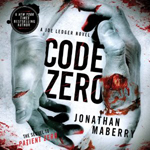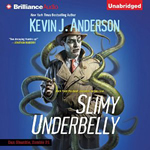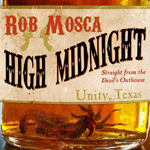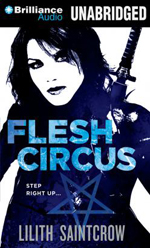
 Code Zero (Joe Ledger #6)
Code Zero (Joe Ledger #6)
By Jonathan Maberry; Read by Ray Porter
Publisher: Macmillan Audio
Publication Date: 25 March 2014
[UNABRIDGED] – 16 hours
Themes: / Horror / Zombies / Terrorists / Covert Intelligence /
Publisher summary:
For years the Department of Military Sciences has fought to stop terrorists from using radical bioweapons—designer plagues, weaponized pathogens, genetically modified viruses, and even the zombie plague that first brought Ledger into the DMS. These terrible weapons have been locked away in the world’s most secure facility. Until now. Joe Ledger and Echo Team are scrambled when a highly elite team of killers breaks the unbreakable security and steals the world’s most dangerous weapons. Within days there are outbreaks of mass slaughter and murderous insanity across the American heartland. Can Joe Ledger stop a brilliant and devious master criminal from turning the Land of the Free into a land of the dead?
Code Zero, a Joe Ledger novel from Jonathan Maberry, is the exciting direct sequel to Patient Zero.
This is the worthy sequel to Patient Zero.
At one point, Rudy Sanchez says that “this has done something fundamental to the American people.”
I’ll tell you this. It did something fundamental to me.
It was exciting, suspenseful, terrifying, and haunted me in my dreams and at random moments in my day.
And it was satisfying. Very satisfying.
I’m not sure Maberry can top this. Though I’m already looking forward to his next attempt to try.
It’s been six years since Joe Ledger was secretly recruited by the government to lead a combat team for the DMS, a taskforce created to deal with problems that Homeland Security can’t handle. That story was told in Patient Zero. This was where we met a group of terrorists who had developed a bio-weapon that turned people into zombies.
Every year since then, like clockwork, Joe and Echo Team have returned to battle a variety of seemingly supernatural foes, all developed by villains who are somehow going to make boatloads of cash off of the terror.
The action-packed stories are full of evil super-villains, noble heroes, smart mouthed quips, a smattering of philosophy about “good guys and bad guys” and heart. Lots of heart. All this is told at a roller coaster pace that barely allows you to breathe until you get to the end.
I love them.
In many ways, this book is similar to the rest of the series. Mother Night, a villain you love to hate, is a super-genius anarchist who’s strewing chaos throughout the country over Labor Day weekend. She’s got the DMS’s computer tied up in knots and old evils that were defeated in previous books are now popping their heads up all over the country. Losses are high and the odds are very much against Ledger and his team. We know Joe will win. It’s watching it happen that makes it fun.
It is superior to the other books, I think, because the pacing is more measured and there is more character development. I also enjoyed the flashbacks into the DMS’s years before Joe joined them.
But in one very important way Code Zero was very different for me.
I felt a level of anxiety that was all out of proportion. Maberry is an expert at ratcheting up the stakes until you just can’t see how anyone decent is going to survive the maelstrom. I was used to that. But somehow this felt different. I got a bit jumpy. I couldn’t quit thinking about the horrific chaos during the day when I had to put the book down. Maberry has his finger on the pulse of the evil that Americans today know all too well … that lurks below the conscious level of our lives … violent chaos that can strike without a moment’s notice. Shootings at Fort Hood, restaurants, schools, and more have changed the mood of our country and made Mother Night’s chaos resonate more deeply than usual.
Along the way, he looks at why people choose good or evil. Code Zero is full of people choosing to save the world or burn it down. In most of the cases, the motivation comes down to something that Maberry does not name, but which I will make bold to label: love. We want to know we matter, that we make a difference, that someone “knows” us. Not for our accomplishments but simply because our “selves” matter.
Mother Night gives it a different name, and she may not tidily fall into this definition but, let’s face it, she’s super-villain crazy. I believe that her ultimate fate bears me out. It shows most in Maberry’s final scenario at the end of the book as the answer to Rudy’s statement that the chaos “has done something fundamental to the American people.
Truly this is a great book, especially for the shoot-em-up genre. It is also probably one that can be read as a stand alone without reading the others that came before.
I listened to the audiobook read by Ray Porter who was superb, as usual, at portraying Joe and every other character along the way. In this book Porter dialed his urgent, driving, delivery down some and thank goodness for that. The action was intense enough without being shoved over the edge of the cliff by a continually urgent tone. Porter also was more nuanced and thoughtful in his reading than I recall in previous Joe Ledger books. If this sounds odd when considering our heroes are fighting off zombies, it actually worked to make me consider the full horror being faced. Once again, kudos to Ray Porter. He’s the reason I always choose audio for the Joe Ledger books.
Posted by Julie D.

 Slimy Underbelly (Dan Shamble, Zombie P.I., Book 4)
Slimy Underbelly (Dan Shamble, Zombie P.I., Book 4) High Midnight
High Midnight


 Code Zero (Joe Ledger #6)
Code Zero (Joe Ledger #6) Flesh Circus (Jill Kismet #4)
Flesh Circus (Jill Kismet #4)